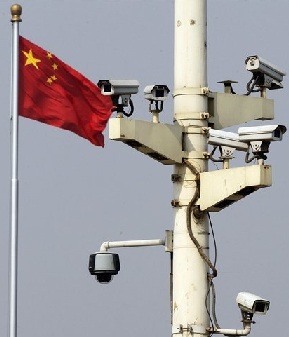Chinese Communist Party
The Chinese Communist Party (CCP)
Chinese Communist Party

The Chinese Communist Party was founded by 70 people in 1921 in Shanghai but grew to strength among the peasant farmers of rural China. From 1927 until 1949, the Chinese Communist Party fought a bitter civil war against the better financed and armed but corrupt Kuomintang. After the Kuomintang's defeat and escape to Taiwan, the Chinese Communist Party founded the People's Republic of China and has ruled it since then.
Today, the 90 million members of the Chinese Communist Party are led by the 65 year-old General Secretary of the Central Committee, Xi Jinping (above center), who recently became constitutionally eligible to rule indefinitely.
How has Chinese Communist Party stayed in power for 70 years?
By maintaining control of the three "P"s: personnel, propaganda, and the People's Liberation Army (PLA). All positions of leadership in government and virtually all positions of leadership in industry and other key sectors of the Chinese society are occupied by Chinese Communist Party members. All media in China is monitored, censored and controlled to always portray Chinese Communist Party in a positive light, and the PLA is sworn to protect the Chinese Communist Party, not China.
Who joins the Chinese Communist Party?
The minimum age for Party membership is 18 years, and in recent years about half of the new members have been university students. Often the brightest students are told that China simply has too many people for everyone to end up well off, so disproportionate wealth and privileges have been reserved for the Party members; if they want to realize the full potential and benefits of their talents, they should join the Party (see China Threat).
Given its seeming strong position, why is Chinese Communist Party so paranoid?
There are two reasons.
1. There are few true communists left in the Chinese Communist Party.
Ever since Deng Xiao Ping declared that to get rich is glorious, becoming wealthier has been the focal aspiration of the Chinese people, including Party members. Communism is still taught in schools and is the official reason for Party gatherings, but very few of its members actually believe in communism today. Most join the Party not because of its ideology but because membership opens doors to jobs, promotions and other benefits.
2. The Party's legitimacy relies on results, not process.
Political parties that rule democracies do so because more people voted for them than for their rivals. The Chinese Communist Party does not have that legitimacy and therefore has been staking its right to rule on its relatively astute stewardship of China's economic growth (see rise of China).
There are two threats to this position: (A) the widening income gap between the rich and the poor; and (B) an economic crash. The former would eventually instigate the poor to rise up. In case of the latter, few would stand with the Party; many members already complain about not receiving enough from the Party in return for their dues and loyalty.